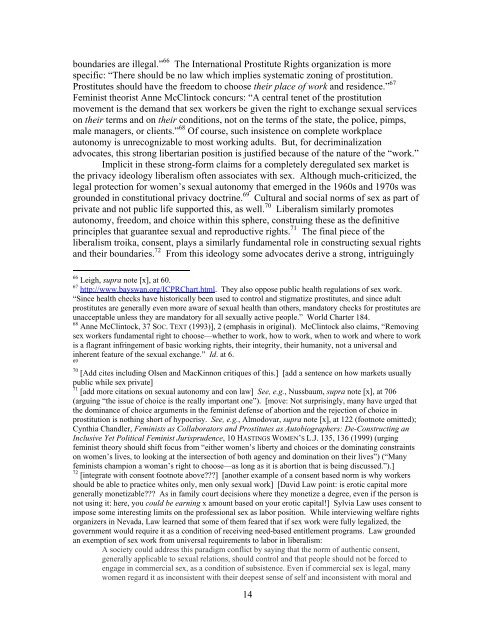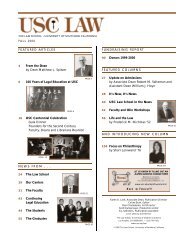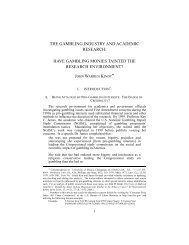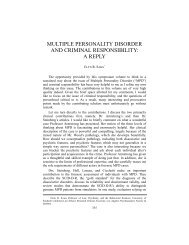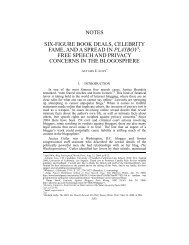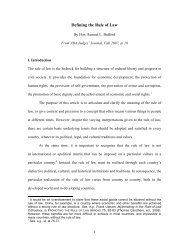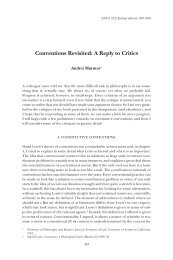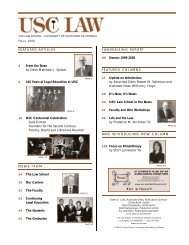1 Regulating Sex Work Adrienne D. Davis VERY ROUGH DRAFT ...
1 Regulating Sex Work Adrienne D. Davis VERY ROUGH DRAFT ...
1 Regulating Sex Work Adrienne D. Davis VERY ROUGH DRAFT ...
Create successful ePaper yourself
Turn your PDF publications into a flip-book with our unique Google optimized e-Paper software.
oundaries are illegal.” 66 The International Prostitute Rights organization is more<br />
specific: “There should be no law which implies systematic zoning of prostitution.<br />
Prostitutes should have the freedom to choose their place of work and residence.” 67<br />
Feminist theorist Anne McClintock concurs: “A central tenet of the prostitution<br />
movement is the demand that sex workers be given the right to exchange sexual services<br />
on their terms and on their conditions, not on the terms of the state, the police, pimps,<br />
male managers, or clients.” 68 Of course, such insistence on complete workplace<br />
autonomy is unrecognizable to most working adults. But, for decriminalization<br />
advocates, this strong libertarian position is justified because of the nature of the “work.”<br />
Implicit in these strong-form claims for a completely deregulated sex market is<br />
the privacy ideology liberalism often associates with sex. Although much-criticized, the<br />
legal protection for women’s sexual autonomy that emerged in the 1960s and 1970s was<br />
grounded in constitutional privacy doctrine. 69 Cultural and social norms of sex as part of<br />
private and not public life supported this, as well. 70 Liberalism similarly promotes<br />
autonomy, freedom, and choice within this sphere, construing these as the definitive<br />
principles that guarantee sexual and reproductive rights. 71 The final piece of the<br />
liberalism troika, consent, plays a similarly fundamental role in constructing sexual rights<br />
and their boundaries. 72 From this ideology some advocates derive a strong, intriguingly<br />
66 Leigh, supra note [x], at 60.<br />
67 http://www.bayswan.org/ICPRChart.html. They also oppose public health regulations of sex work.<br />
“Since health checks have historically been used to control and stigmatize prostitutes, and since adult<br />
prostitutes are generally even more aware of sexual health than others, mandatory checks for prostitutes are<br />
unacceptable unless they are mandatory for all sexually active people.” World Charter 184.<br />
68 Anne McClintock, 37 SOC. TEXT (1993)], 2 (emphasis in original). McClintock also claims, “Removing<br />
sex workers fundamental right to choose—whether to work, how to work, when to work and where to work<br />
is a flagrant infringement of basic working rights, their integrity, their humanity, not a universal and<br />
inherent feature of the sexual exchange.” Id. at 6.<br />
69<br />
70<br />
[Add cites including Olsen and MacKinnon critiques of this.] [add a sentence on how markets usually<br />
public while sex private]<br />
71<br />
[add more citations on sexual autonomy and con law] See, e.g., Nussbaum, supra note [x], at 706<br />
(arguing “the issue of choice is the really important one”). [move: Not surprisingly, many have urged that<br />
the dominance of choice arguments in the feminist defense of abortion and the rejection of choice in<br />
prostitution is nothing short of hypocrisy. See, e.g., Almodovar, supra note [x], at 122 (footnote omitted);<br />
Cynthia Chandler, Feminists as Collaborators and Prostitutes as Autobiographers: De-Constructing an<br />
Inclusive Yet Political Feminist Jurisprudence, 10 HASTINGS WOMEN’S L.J. 135, 136 (1999) (urging<br />
feminist theory should shift focus from “either women’s liberty and choices or the dominating constraints<br />
on women’s lives, to looking at the intersection of both agency and domination on their lives”) (“Many<br />
feminists champion a woman’s right to choose—as long as it is abortion that is being discussed.”).]<br />
72<br />
[integrate with consent footnote above???] [another example of a consent based norm is why workers<br />
should be able to practice whites only, men only sexual work] [David Law point: is erotic capital more<br />
generally monetizable??? As in family court decisions where they monetize a degree, even if the person is<br />
not using it: here, you could be earning x amount based on your erotic capital!] Sylvia Law uses consent to<br />
impose some interesting limits on the professional sex as labor position. While interviewing welfare rights<br />
organizers in Nevada, Law learned that some of them feared that if sex work were fully legalized, the<br />
government would require it as a condition of receiving need-based entitlement programs. Law grounded<br />
an exemption of sex work from universal requirements to labor in liberalism:<br />
A society could address this paradigm conflict by saying that the norm of authentic consent,<br />
generally applicable to sexual relations, should control and that people should not be forced to<br />
engage in commercial sex, as a condition of subsistence. Even if commercial sex is legal, many<br />
women regard it as inconsistent with their deepest sense of self and inconsistent with moral and<br />
14


